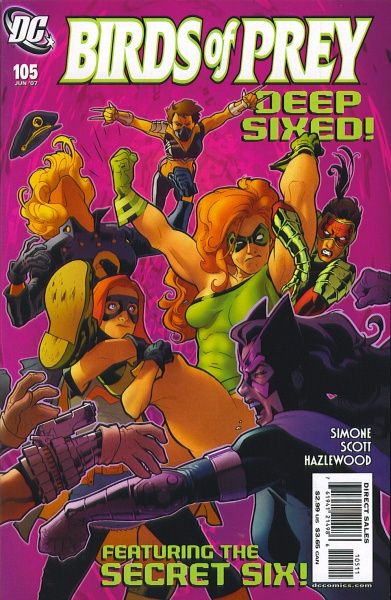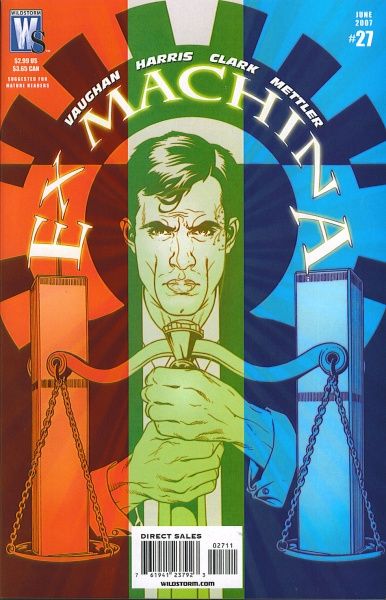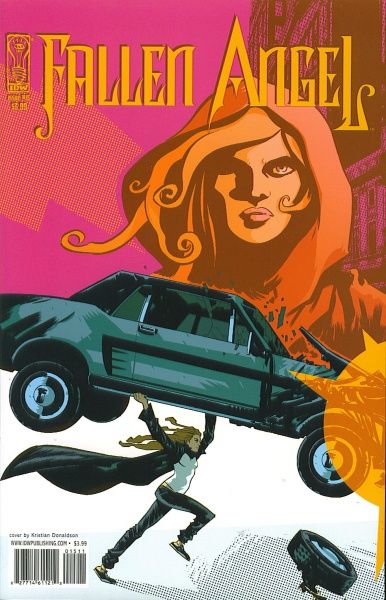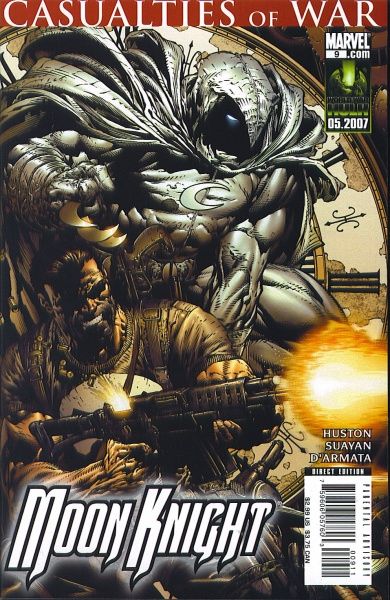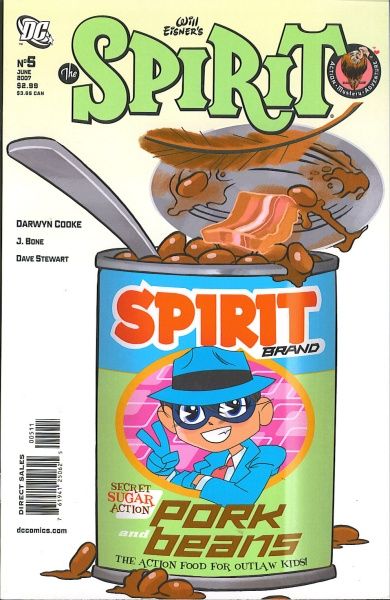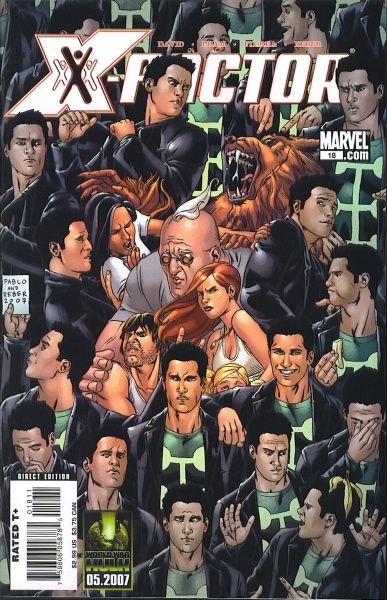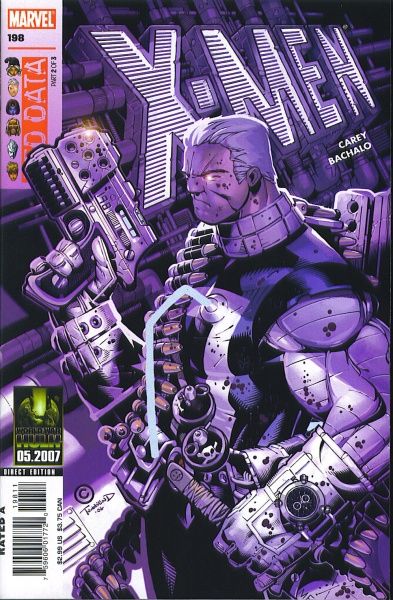Not a bad week in the comics world, but once again I am called upon to defend the one purchase I make that makes everyone's brain hurt. Luckily, I'm up to the task!
Birds of Prey #105 by Gail Simone, Nicola Scott, and Doug Hazelwood. $2.99, DC.
Hmmm. I purchased this based on the recommendations of the readers, because several suggestionstied for most votes. I didn't get DMZ because I wasn't impressed with it the first time around,and I figured ifI ever get curious about it I can read a trade to see if it's gotten any better. Meanwhile, I figured I would wait until next issue to read Manhunter and I couldn't find a copy of Love& Rockets. C'est la vie! I've been hearing good things about Ms. Simone's little book that could, so I figured I would give it a try.
Well, it's okay. It's nothing that is really going to make me gasp in amazement, but as fair-to-middling superhero books go, it's a decent read. I'm not sure what I was expecting with it, but it lacked the wit and crackle of many of Simone's books.Her portrayal of the Secret Six feels different from their portrayal in their own book, even though it's the same writer.I mean, I know Lawton is supposed to be a tool, but even that doesn't mean he would keep desperately trying to make a dick joke. Maybe it would. Their interaction is just a bit askew, as if they were actors trying to fill the roles of the "real" Secret Six (yes, I know they're all fictional characters). Remember when Jeremy Piven and the other two actors were on the fictional Seinfeld pilot? How weird it wasseeing them "act" like the regulars? That's what this felt like. I could be wrong.
The whole issue is kind of like that, as Helena sticks a gun in someone's faceholding it sideways, which cracked me up (because it's such a cliche, not because it waskewl), and Kendra fights Scandal after dropping her weapons because she wants to prove how tough she is. (Doesno one in a particular comic book or movie or television show watch/read any other movie, television show, or comic? This is never a good idea.) It's just sloppy storytelling, using standard stereotypes instead of actually considering what might be a smart idea. I mean, please - if Scandal takes her weapons off, challenging Kendra to a bare-knuckle chick fight, the correct response from Kendra is, "Yeah, I'm not full of testosterone needing to prove my manhood. Thanks for making it easier." And then she pummelsScandal with that mace thing.
The return of Ice is nice to see, but that's about it. Scott's art is decent, and it's nice to see women in comics that actually look like women (funny how male artists can't seem to grasp that a woman can be attractive without being ridiculously buxom - all the women in this comic are attractive yet realistic). It's nothing spectacular, but she does a nice job with facial expressions, as there are a lot of people in this book and some don't have many lines. Scott gives us some insight into those who don't talk, and that's good to see.
I really wanted to like this comic, because I had heard so many good things about it. I don't doubt that it's entertaining, but except for the fact that the heroes are women, it doesn't really distinguish itself from the many other superhero books. I know it's the second part of a storyline, but I'm not talking about the actual story, which appears to have something to do with getting Ice out of Russia. If you pick up a random issue of Simone's Welcome to Tranquility, you won't know what's going on (perhaps), but the characters have more verve than they do here. It's too bad.
Ex Machina #27 by Brian K. Vaughan, Tony Harris, and Jim Clark. $2.99, DC/Wildstorm.
Our very own MarkAndrew is amazed at how poorly written this comic book is, and I'd like him to explain himself! Actually, I have noticed a few things creeping in that I don't like about the book, but it's not enough to make me turn on it - it's still a very good comic. I know it's always had some harsh language, but its usage appears to be growing, and I'm not sure why, nor do I like it. Maybe I'll have to go back to the early issues and see if Mitchell says "fuck" more now or if I'm just noticing it, but it seems like Vaughan is throwing it around more just for shocks, and we all know it doesn't really have that effect anymore. Vaughan's predilection for throwing useless trivia at us shows up in this issue, and it's off-putting as ever (it's not exactly annoying, but it does break up the flow of the issue a bit). But the story continues to be interesting, as the guy from (presumably) the future goes looking for Mitchell, and our esteemed mayor deals with the power outage. As usual with this book, it moves a bit slowly, but not so much that you lose interest, and even the hint that Mitchell might have lost his powers (I can't imagine they won't come back) throws a nice wrench in the works. So although I see where Mark is coming from, I don't share his hatred of the book. It's still a fascinating comic about a superhero mayor, with all the problems of politics and the inherent weirdness of the spandex set. And Harris' art in this issue is great as usual.
Fallen Angel #15 by Peter David and Kristian Donaldson. $3.99, IDW.
This is a flashback issue, as we learn the secrets of Lin, Lee's predecessor as "protector of the downtrodden" in Bete Noire. Donaldson's art, though harder and more angular than Woodward's, fits the tone of the book, as we look back on a time when the Dr. Juris had lost interest in making the city habitable and the dark side was taking over. So Donaldson's kind of punk style does a good job at conveying the roughness of the city back in the day, and Rhonda Pattison's colors (assisted by Donaldson herself) give this a darker look than what we usually see. As Bete Noire is in Louisiana and probably could be considered some otherworldly New Orleans stand-in, the art feels like jazz.
As for the story, it's a fairlystandard origin story, except for the fact that the origin is being told to the person to whom it happened,Lin. She has no memory of her past, so Dolf fills her in. She shows up in town, excites the wrath of a local pimp, who then sets fire to her place (and since she's staying with Dolf, his bar as well). Exactly what happens next will show up in the next issue.
As usual, it's a good read that manages to push the story forwardwhile presenting an entertaining tale in its own right. Just another issue of one of the better books on themarket.
Moon Knight #9 by Charlie Huston and Mico Suayan. $2.99, Marvel.
You know, whenever people question my taste in comics, it always seems to come down to: "You like Moon Knight." Now, some people might think those four simple words are enough, but it kind of bugs me. John and acespot and Tim (who liked Fallen Son: Wolverine - really, Tim?) just can't understand why on earth I would "waste my money" on stuff like this. If any of those gentlemen spent money on and/or read and enjoyed World War III, they no longer have a dog in the race, in my opinion. But, you know, it's my money. I don't buy video games or go to the movies, so I spend it on comic books.
Tim, specifically, likens this to Marvel's version of Faust, meaning it's "violence porn." I have no interest in getting into how almost every single comic book on the market is violence porn in some form or another, but long-time readers know that I actually own every issue of Faust, and think that, although it's not a great comic by any stretch of the imagination, if Marvel had any balls they would publish stuff like it. But Joey Q doesn't, even though this comic does crank up the violence quite a bit. But unlike most of the other comics around, this shows the consequences of such violence much better, and therefore it's a far better examination of what it means to be a costumed vigilante. Marc Spector is no longer young, and throughout this series he has been trying to figure out what he has done with his life and if he's going to continue on this path. The fact that he's kind of insane as well makes this walk on the razor's edge even more meaningful. With many superheroes, they might experience a moment of craziness and then next issue they're back to kicking ass with no recriminations. Spector is living with his choices, and so are the people close to him. Yes, it's "violence porn," but unlike almost every single comic on the stands, it examines the consequences of that violence porn. Look at that abomination in four parts that DC released today. Will anyone remember that Terra got slaughtered in another week or so? Who the fuck remembers Looker (besides me, of course, because I moved one of my daughters into the garage to build a shrine to her in a bedroom)? So yes, Moon Knight is violent. I'd rather see a superhero rehabbing, as Spector does in this issue, because of his violent lifestyle, instead of having lame-ass "healing" powers, which it seems like every hero these days has ("Gosh, my spleen is hanging out, but it seems to be crawling back into my body thanks to these suddenly-discovered healing powers! How cool is that?").
Suayan's art is less hyper-stylized than Finch's, which might make some people happy. Maybe he won't make it so pornographic.
So, is that good enough for the critics? Perhaps. I trust people who don't like Moon Knight also don't buy anything by Garth Ennis, this week's Hellblazer, Invincible (man, that gets bloody sometimes) or ... well, gosh, this week's next selection, which lovingly portrays people getting shot and beaten up, plus beastiality!Now that's wholesome!
The Spirit #5 by Darwyn Cooke and J. Bone. $2.99, DC.
Because I love the violence and man-vulture love, I really enjoyed this installment of The Spirit. This was the first issue that really had a sense of more than just Cooke showing off. Faithful readers know that the only issue I haven't bought is #2, and although I have liked it enough to come back to the book, I don't see what all the fuss is about. So far it has seemed that Cooke is simply doing these stories to show that he knows how to write a comic book featuring the Spirit, and that's not a very good reason. In this comic, he gives us a goofy-yet-plausible premise, thatbad guys are using the Spirit's image to sell "old Russian army rations" to kids; he gives us plenty of action; he gives us a nasty bad guy who wants to horn in on the food-making business; he gives us the Spirit doing some actual superheroing; he gives us Mr. Carrion and his unnatural love for his pet vulture. Seriously. And frankly, it's not as creepy as it sounds. Okay, it is. But still. Man-vulture love. Good stuff.
The nice thing about this issue is that it tells a story. In issue #1, we had that hostage crisis with that reporter chick, but it felt like Cooke was just introducing the character. I didn't get issue #2 (but maybe I should). Issue #3 was an origin issue, and was okay. Last issue was more of the "Look-how-clever-I-am-because-I-can-write-a-Spirit-story" kind of thing that is certainly not bad, but not terribly memorable. While this isn't a great issue, it's a very solid one, because Cooke channels his delight at writing The Spirit (I have to assume he's delighted) into ancillary goodness (the commercials for the pork and beans) that enhance the story rather than making it the story itself. That's why this is the best issue so far.
Next issue it seems as if he's going to experiment with something. Maybe not. If the whole point of Eisner's Spirit is to tell different kinds of stories, it would be nice to see Cooke do that. Maybe these early issues are simply establishing the characters, and we'll get more interesting ways to tell stories soon. That would be nice.
X-Factor #18 by Peter David, Khoi Pham, and Sandu Florea. $2.99, Marvel.
David is a writer who occasionally slips into gratuitous pop culture references, and in this issue, it's Sponge Bob Square Pants. But that aside, he's still one of the better writers working in comics these days, and he continues to do a fine job on this minor mutant mag. This is in the middle of a story, so there's a lot of treading water, but David is smart enough to keep things crackling even when that's happening. So here he gets to the big reveal at the end (Marrow shows up as a member of X-Cell) by a nice means, as Layla Miller, who doesn't think X-Factor should do anything about the terrorists, sends the members of the group to various places in the city, and the actions they take lead to Marrow being revealed. David has done this kind of thing before (the excellent Major Disaster issue of Aquaman comes to mind), but so what? He does, as usual, a nice job introducing stuff from earlier issues, like the French orphan Monet and Teresa bring back from their vacation, while still sticking to the main story. And it's interesting that we believe the Blob is no longer a threat, because David, in just a few lines, makes it plausible.
Pham continues his guest stint on the book, and although it's rougher than Raimondi and Calero,that doesn't make it bad. It's fine, although nothing entirely memorable. I don't like Pietro's hairstyle. It'sgoofy.
This bookkeepstrucking along. The nice thing about it is that David will probably stay on it forever, as long as it doesn't get cancelled.It won't attract new readers, because people who don't likeDavid will never like David, but at least he's in it for the long term, so we'll get good stories that create their own history.
X-Men #198 by Mike Carey, Chris Bachalo, and Tim Townsend. $2.99, Marvel.
Astonishingly, there's only one inker for this book, implying that Bachalo had plenty of time to finish, yet it's perfectly coherent. Okay, I'm not entirely sure how Creed escapes or if the final panel we see of him before he escapes is supposed to clue us in, but that might be Carey's fault as much as Bachalo's. The bad guy, who turns out to be an artificially-created Mummudrai, is very cool-looking, and the fight scenes, which occasionally are very sloppy when Bachalo's drawing them, are neat to behold. Meanwhile, the double-paged spread giving us the history of the fake Mummudrai is spectacular. The coloring is very interesting, too - It's been kind of washed-out for some time in this book, and it gives the book a neat, "realistic" look, because not everything is vividly bright (or brightly vivid). I wonder if that helps the pencilling look better.
Carey's doing a good job with these stories, too, even though this is tangentially related to the Shi'ar and I'm getting sick of those stupid aliens. However, it's only "tangentially" related, and it's good to see these characters, who don't really know or even like each other, trying to work together. So they talk hesitantly, flirt awkwardly (I still think Bobby and Mystique together is weird, but I like how they talk to each other), and aren't sure if they can trust each other. The threats feel important, too, which is in contrast to Brubaker's space epic, which doesn't. So it's a more interesting comic than Uncanny.
I'm looking forward to the resolution of the story. It's neat-o.
Well, that's all for this week. On a side note, although I don't often pimp my other blogs, I like to reflect upon my daughter's progress occasionally, and I did so the other day. Read it here if you like. Or don't. It's your choice! It is, I admit, much more fun to bash me for my silly comic book choices. So bash away!


